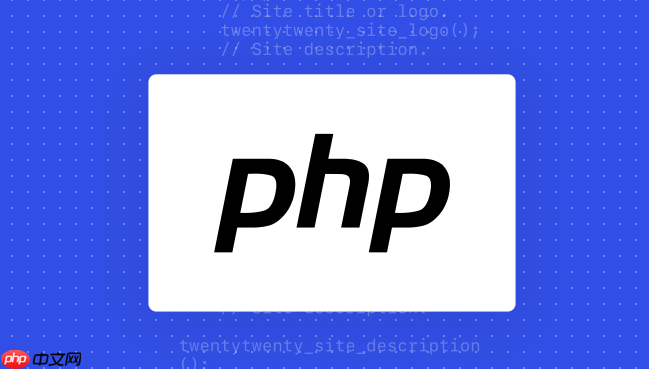PHP执行外部命令需谨慎,核心函数包括exec()、shell_exec()、system()和passthru(),各自适用于不同场景:exec()适合获取命令状态及逐行输出;shell_exec()用于获取完整输出字符串;system()直接输出结果到页面;passthru()则适合处理二进制数据流。然而,直接执行Shell命令存在严重安全风险,尤其是命令注入漏洞,攻击者可通过拼接恶意参数执行任意系统命令,导致信息泄露、数据破坏或服务器被控。为防范风险,应采用输入验证、白名单、escapeshellarg()等净化函数,遵循最小权限原则,并在不需要时禁用相关危险函数。对于复杂需求,proc_open()提供更精细的进程控制和I/O管理,支持独立处理标准输入、输出和错误流,提升安全性与灵活性,但使用复杂度更高,需注意资源释放与阻塞模式配置。总之,优先考虑PHP内置函数替代Shell调用,确需执行时应层层设防,避免用户输入直接参与命令构造。

PHP执行外部命令,核心在于利用其内置的几个函数与操作系统进行交互,最常见且直接的方式包括
exec()
shell_exec()
system()
passthru()
PHP提供了多种函数来执行外部命令,每种都有其特定的行为和适用场景。
1. exec()
exec(string $command, array &$output = null, int &$return_var = null): string|false
command
$output
$return_var
<?php
$command = 'ls -l /tmp';
$output = [];
$return_var = 0;
$last_line = exec($command, $output, $return_var);
echo "最后一行输出: " . $last_line . "\n";
echo "所有输出:\n";
foreach ($output as $line) {
echo $line . "\n";
}
echo "命令返回码: " . $return_var . "\n";
?>我个人觉得,当你只需要一个命令的最终状态或某个特定结果时,
exec()
2. shell_exec()
shell_exec(string $command): string|null
exec()
command
null
<?php
$command = 'cat /etc/os-release';
$full_output = shell_exec($command);
if ($full_output === null) {
echo "命令执行失败或无输出。\n";
} else {
echo "完整输出:\n" . $full_output . "\n";
}
?>当我需要完整、未经处理的命令输出时,
shell_exec()
立即学习“PHP免费学习笔记(深入)”;
3. system()
system(string $command, int &$return_var = null): string|false
system()
command
$return_var
<?php
echo "正在执行系统命令并直接输出:\n";
$return_var = 0;
$last_line = system('echo "Hello from system!" && whoami', $return_var);
echo "命令的最后一行输出: " . $last_line . "\n";
echo "命令返回码: " . $return_var . "\n";
?>system()
4. passthru()
passthru(string $command, int &$return_var = null): void
passthru()
command
$return_var
<?php
header('Content-Type: text/plain'); // 假设我们要输出原始文本
echo "正在执行 passthru 并直接输出原始数据:\n";
$return_var = 0;
passthru('cat /proc/cpuinfo', $return_var);
echo "\n命令返回码: " . $return_var . "\n";
?>passthru()
说实话,PHP执行外部命令,最让我头疼的,也是最危险的,就是各种形式的命令注入(Command Injection)。这就像是给你的服务器开了一扇门,但你却没锁好。
想象一下,你的代码长这样:
exec("ping -c 4 " . $_GET['ip']);ip
127.0.0.1
127.0.0.1; rm -rf /
127.0.0.1 && cat /etc/passwd
;
&&
cat /etc/passwd
ls -al /
此外,一些不那么明显但同样危险的问题包括:
../
坦白说,每次我看到有人直接将用户输入拼接到Shell命令中,都会替他们捏一把汗。这种做法几乎是邀请攻击者来“玩弄”你的服务器。
要在PHP中安全地执行Shell命令,这需要一套组合拳,而不是单一的银弹。我的经验告诉我,关键在于“防御性编程”和“最小权限原则”。
1. 严格的输入验证与净化: 这是第一道防线,也是最重要的。
escapeshellarg()
escapeshellarg()
<?php
$filename = $_GET['file'] ?? 'default.txt';
$safe_filename = escapeshellarg($filename); // 将用户输入视为一个整体的参数
// 假设我们只允许查看指定目录下的文件
exec("cat /var/www/data/{$safe_filename}");
?>这里
escapeshellarg()
foo; rm -rf /
'foo; rm -rf /'
escapeshellcmd()
escapeshellarg()
escapeshellcmd()
2. 最小权限原则: 你的PHP进程应该以最低必要的权限运行。如果PHP进程没有执行某个命令或访问某个文件的权限,那么即使攻击者成功注入了该命令,它也无法执行。
3. 禁用不必要的函数: 如果你的应用不需要执行外部命令,那么在
php.ini
disable_functions
exec
shell_exec
system
passthru
proc_open
disable_functions = exec,shell_exec,system,passthru,proc_open
4. 考虑使用 proc_open()
proc_open()
5. 避免直接拼接用户输入: 这听起来像废话,但却是最常犯的错误。永远不要直接将未经处理的用户输入拼接进你的Shell命令字符串。
6. 替代方案: 很多时候,你可能根本不需要执行外部命令。PHP自身提供了丰富的文件系统函数、网络函数、图像处理库等。在决定使用Shell命令之前,先问问自己:PHP能直接完成这个任务吗?例如,创建目录可以用
mkdir()
system('mkdir ...')proc_open()
当我需要对外部进程有更细粒度的控制时,
proc_open()
exec()
shell_exec()
优势:
proc_open()
stream_select()
proc_open()
proc_get_status()
proc_terminate()
proc_open()
复杂性:
proc_open()
fclose()
proc_close()
shell_exec()
proc_open()
proc_open()
stream_set_blocking()
stream_select()
一个简单的 proc_open()
<?php
$command = 'grep root /etc/passwd'; // 查找包含'root'的行
$descriptorspec = [
0 => ["pipe", "r"], // stdin 是一个管道,供子进程读取
1 => ["pipe", "w"], // stdout 是一个管道,供子进程写入
2 => ["pipe", "w"] // stderr 是一个管道,供子进程写入
];
$process = proc_open($command, $descriptorspec, $pipes);
if (is_resource($process)) {
// 关闭 stdin,因为我们不打算向 grep 发送任何输入
fclose($pipes[0]);
// 读取 stdout
$stdout = stream_get_contents($pipes[1]);
fclose($pipes[1]);
// 读取 stderr
$stderr = stream_get_contents($pipes[2]);
fclose($pipes[2]);
// 关闭进程
$return_code = proc_close($process);
echo "STDOUT:\n" . $stdout . "\n";
echo "STDERR:\n" . $stderr . "\n";
echo "Return Code: " . $return_code . "\n";
} else {
echo "无法启动进程。\n";
}
?>在我看来,如果你只是想简单地运行一个命令并获取其全部输出,
shell_exec()
proc_open()
以上就是PHP如何执行外部命令_PHP执行服务器Shell命令的方法与安全风险的详细内容,更多请关注php中文网其它相关文章!

PHP怎么学习?PHP怎么入门?PHP在哪学?PHP怎么学才快?不用担心,这里为大家提供了PHP速学教程(入门到精通),有需要的小伙伴保存下载就能学习啦!

Copyright 2014-2025 https://www.php.cn/ All Rights Reserved | php.cn | 湘ICP备2023035733号